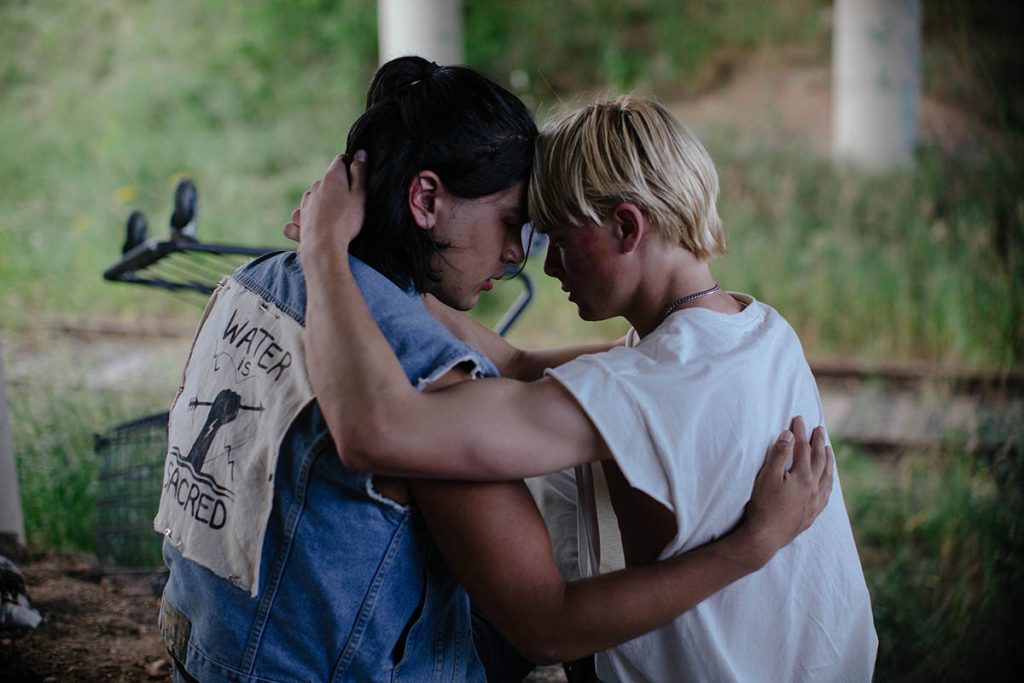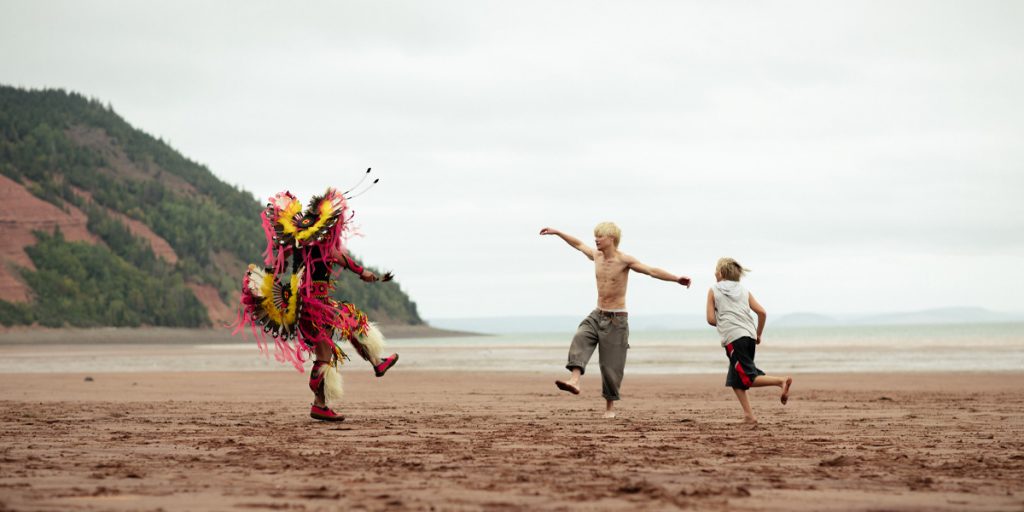Labelled as a “two-spirit odyssey,” Wildhood is a decently well-made road trip film with significant (and successful) representation of Canada’s Indigenous population.
In a rural Canadian trailer park, Link (Philip Lewitski) lives with his younger half-brother Travis (Avery Winters-Anthony). Their vicious, cruel father (Joel Thomas Hynes) regularly beats Link, including when the two are arrested for trying to steal some copper pipes. But Link – who has slowly come to resist his father and his violence – has a plan to escape. As he puts it into action one night, he finds a series of letters from his Mi’kmaw mother. His father had told him she was dead, but now Link wants to try and find her. He sets his father’s truck on fire and runs away with Travis. Along the way, they meet a helpful pow wow dancer named Pasmay (Joshua Odjick). Link is initially hostile to him, but eventually, he and Travis decide to tag along with Pasmay. And as their journey progresses, the two boys find themselves drawn to each other.
Wildhood marks the feature debut of non-binary, two-spirit filmmaker Bretten Hannam (‘Two-Spirit’ is a term used by indigenous LGBTQIA+ members who identify as having both a male and female spirit). The film (an adaptation of their 2019 short film) is essentially a folksy road trip movie. The trio of Link, Travis and the two-spirit Pasmay travel across the Mi’kma’ki region to try and help Link find his mother and his place in the world. It is set in and amongst nature, with multiple scenes of the group playing in nature or splashing about in a lake. And it is well-made, from cinematographer Guy Godfree’s long takes – including one exhilarating shot placed in Pasmay’s pick-up truck – to a soundtrack full of rap and indie sounds.
The Indigenous Canadian population get some significant representation here thanks to Kespukwitk native Hannam. At one point, Pasmay (who keeps his pow wow regalia in a case) teaches Link how to perform his culture’s dance. Lead actors Lewitski and Odjick have Native ancestry – Lewitski is part-Mohawk whereas Odjick was born in Ontario and raised in the Kitigan Zibi Anishinabeg community. Veteran Plains Cree actor Michael Greyeyes (recently seen alongside Mark Ruffalo in HBO’s I Know This is True) is an important presence as pastry chef Smokey. Meanwhile, Becky Julian makes her film debut to play a Mi’kmaw elder. The film is extremely successful in its attempt to boost this Indigenous representation, celebrating Mi’kmaw culture whilst also using it to help Link’s quest of self-discovery.

All three boys carry their scars. Travis has a large patch over his left eye whilst the dye blonde-haired Link is battered and bruised with a persistent red mark on the side of his face. But they also have mental burdens. Link holds angry and repressed feelings; Travis sometimes makes inappropriate and tactless comments. There is a question of how much living with their non-Indigenous father has negatively influenced Travis and Link. Pasmay also suffered abuse at the hands of his dad and was kicked out of the family for his sexuality. Now he is a drifter – free without feeling free – and probably sticks with the brothers longer than he needs to because he does not want to be alone.
Whilst this is all interesting, I did have one massive problem with Wildhood. Although the budding romance between Link and Pasmay is a crucial element of Hannam’s narrative, I didn’t feel as connected to it as I should have been. This should not take anything from the good, multifaceted performances from Phillip Lewitski and Joshua Odjick. They even help to make the story slightly more engaging in the final third, as their characters open up to each other. However, the film never focuses enough on their dynamic, which makes their eventual moment of passion less meaningful. It’s a shame because Wildhood is definitely more appealing when it focuses on them. But in the end, the film’s groundbreaking, incredibly successful representation of Canada’s Mi’kmaw community overshadows its well-meaning yet average road trip story.
Wildhood was screened at the 2022 BFI Flare Film Festival on 24-25 March, 2022, and was released on digital in the US on June 24. In the UK, the film will be out in cinemas and on demand from September 2.

